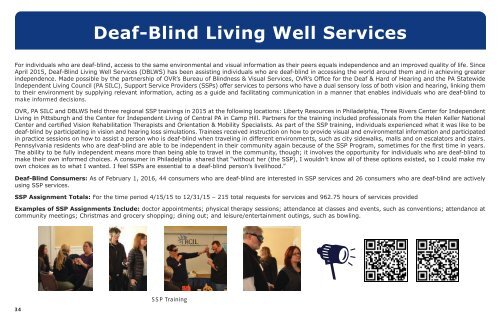Office of Vocational Rehabilitation
2015_ovr_annual_report
2015_ovr_annual_report
Create successful ePaper yourself
Turn your PDF publications into a flip-book with our unique Google optimized e-Paper software.
Deaf-Blind Living Well Services<br />
For individuals who are deaf-blind, access to the same environmental and visual information as their peers equals independence and an improved quality <strong>of</strong> life. Since<br />
April 2015, Deaf-Blind Living Well Services (DBLWS) has been assisting individuals who are deaf-blind in accessing the world around them and in achieving greater<br />
independence. Made possible by the partnership <strong>of</strong> OVR’s Bureau <strong>of</strong> Blindness & Visual Services, OVR’s <strong>Office</strong> for the Deaf & Hard <strong>of</strong> Hearing and the PA Statewide<br />
Independent Living Council (PA SILC), Support Service Providers (SSPs) <strong>of</strong>fer services to persons who have a dual sensory loss <strong>of</strong> both vision and hearing, linking them<br />
to their environment by supplying relevant information, acting as a guide and facilitating communication in a manner that enables individuals who are deaf-blind to<br />
make informed decisions.<br />
OVR, PA SILC and DBLWS held three regional SSP trainings in 2015 at the following locations: Liberty Resources in Philadelphia, Three Rivers Center for Independent<br />
Living in Pittsburgh and the Center for Independent Living <strong>of</strong> Central PA in Camp Hill. Partners for the training included pr<strong>of</strong>essionals from the Helen Keller National<br />
Center and certified Vision <strong>Rehabilitation</strong> Therapists and Orientation & Mobility Specialists. As part <strong>of</strong> the SSP training, individuals experienced what it was like to be<br />
deaf-blind by participating in vision and hearing loss simulations. Trainees received instruction on how to provide visual and environmental information and participated<br />
in practice sessions on how to assist a person who is deaf-blind when traveling in different environments, such as city sidewalks, malls and on escalators and stairs.<br />
Pennsylvania residents who are deaf-blind are able to be independent in their community again because <strong>of</strong> the SSP Program, sometimes for the first time in years.<br />
The ability to be fully independent means more than being able to travel in the community, though; it involves the opportunity for individuals who are deaf-blind to<br />
make their own informed choices. A consumer in Philadelphia shared that “without her (the SSP), I wouldn’t know all <strong>of</strong> these options existed, so I could make my<br />
own choices as to what I wanted. I feel SSPs are essential to a deaf-blind person’s livelihood.”<br />
Deaf-Blind Consumers: As <strong>of</strong> February 1, 2016, 44 consumers who are deaf-blind are interested in SSP services and 26 consumers who are deaf-blind are actively<br />
using SSP services.<br />
SSP Assignment Totals: For the time period 4/15/15 to 12/31/15 – 215 total requests for services and 962.75 hours <strong>of</strong> services provided<br />
Examples <strong>of</strong> SSP Assignments Include: doctor appointments; physical therapy sessions; attendance at classes and events, such as conventions; attendance at<br />
community meetings; Christmas and grocery shopping; dining out; and leisure/entertainment outings, such as bowling.<br />
34<br />
SSP Training


